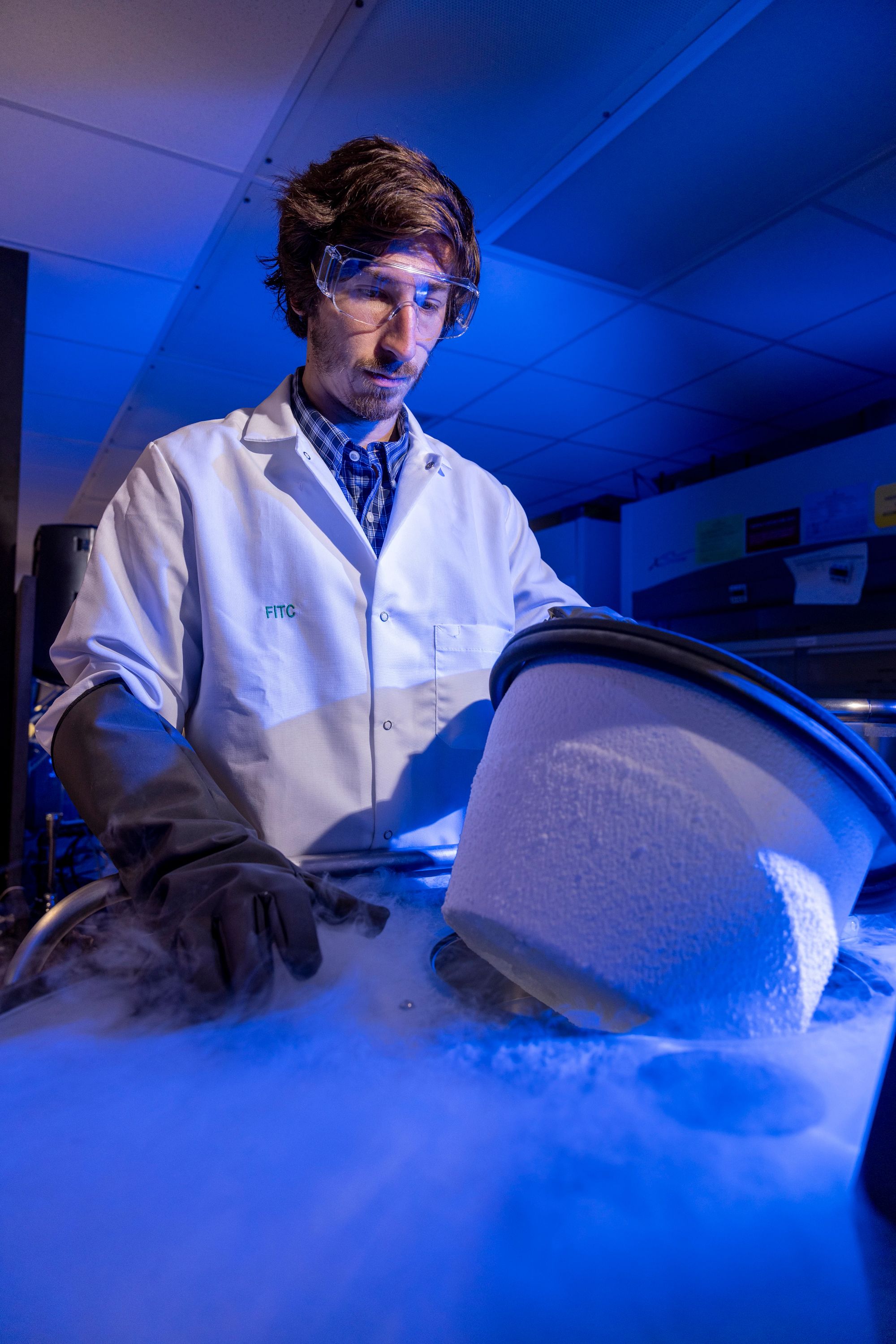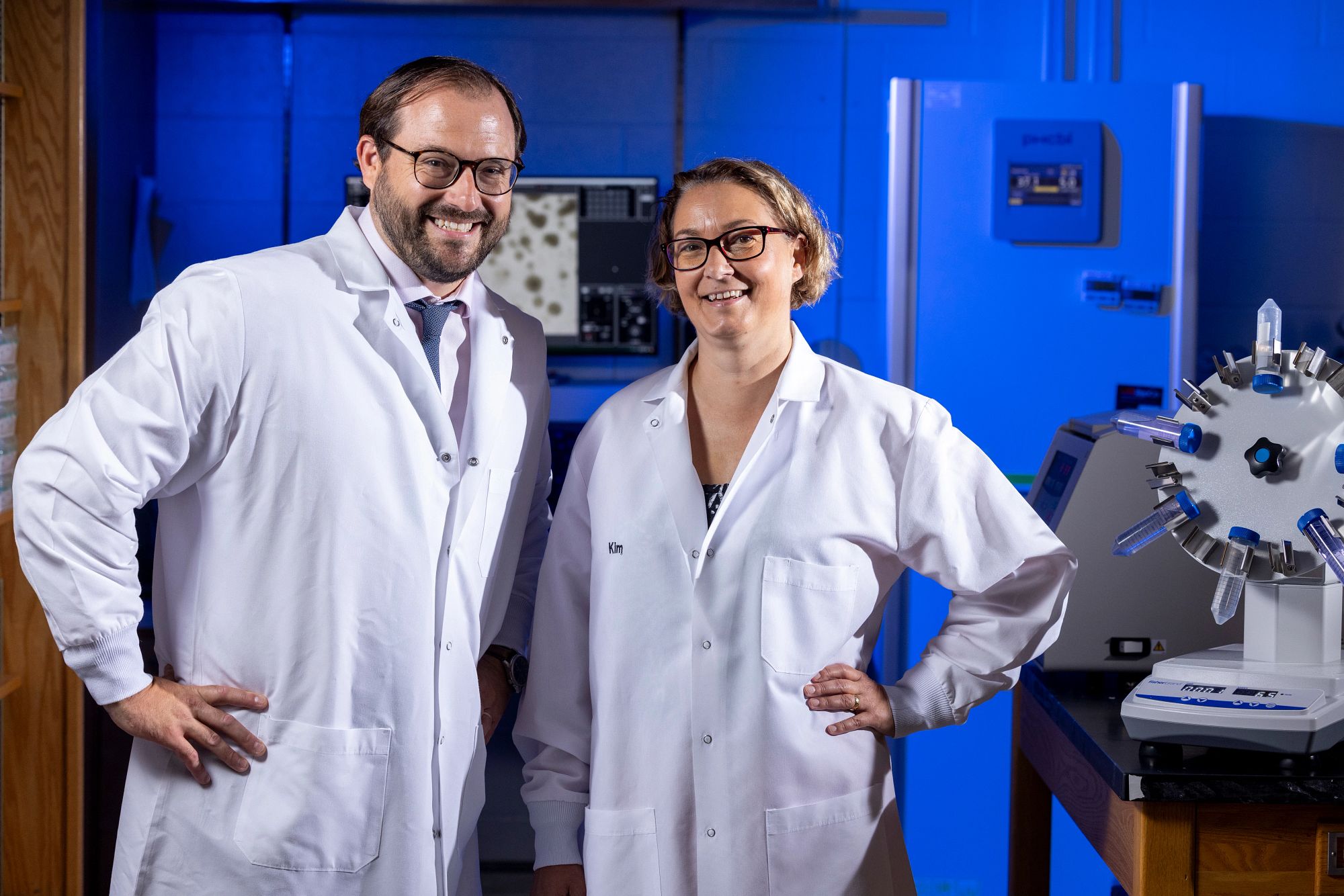One Planet, One Health
UGA’s unique approach integrates precision medicine with a holistic focus on health care.
By Amy H. Carter

Richard and Kim Stamper love dogs and the Dawgs. Pet parents to Golden Retrievers named for two Atlanta Braves icons – Hank Aaron and Chipper Jones – they are both graduates of the Terry College of Business, fans of Bulldog athletics, and avid benefactors across the University of Georgia.
Recently, they’ve found common ground with researchers in the College of Veterinary Medicine. Richard Stamper’s battle with melanoma introduced the couple to Georgia-based cancer research initiatives. Richard participated in a successful immunotherapy trial at Emory University, and the pair are establishing an endowed fund to support UGA’s Precision One Health Initiative.
The program appeals in part because of the focus on personalized cancer therapies, and because it unites various departments and colleges in pursuit of a common goal.
Kim and Richard Stamper at home with Hank and Chipper.
Kim and Richard Stamper at home with Hank and Chipper.
Precision One Health is not only exploring the roles that genetics, the environment, and lifestyle have on disease prevention and treatment, it is also testing the ways that a range of disciplines can work together to elevate health care
“Historically, talented research groups tend to work in silos, and they may not communicate or talk to one another. If they find ways to collaborate, it can make a big difference,” Richard said.
The program’s impact on patients and students inspires Kim as a donor and alumna getting reacquainted with the innovative research happening at UGA. “It’s very exciting. I wish I could go back as a student, because the opportunities are so great,” Kim said.
A Rising Medical Powerhouse
At the University of Georgia, One Health isn’t just a concept. It’s the driving principle behind some of the university’s most cutting-edge research. One health focuses on the connections between human, animal, and environmental health.
With the establishment of its new School of Medicine, UGA joins an elite group of universities in the nation with schools of human medicine, veterinary medicine, and agriculture on one campus. These three disciplines – working with top-notch researchers in public health, pharmacy, engineering, arts and sciences, ecology, law, agriculture, forestry and natural resources, and journalism and mass communication – position UGA to uniquely impact the one health stage.
“By working together, we can accelerate the discoveries of cures and then speed up the translation of discoveries to bedside practice,” said Senior Vice President for Academic Affairs and Provost S. Jack Hu.

Optimizing Therapeutic and Preventive Health Care
The Precision One Health research approach focuses on optimizing therapeutic and preventive care for people, animals, and the environment. To do this, researchers rely on collective interdisciplinary expertise in four core areas: 1) translational medicine, 2) systems modeling and data analytics, 3) epidemiology and disease ecology, and 4) social sciences and medicine.
“In just one year, we have achieved significant progress, now boasting nearly 24 faculty members, securing close to $7 million of funding, and expanding to over 70 faculty across various colleges and units,” said Dr. Jon P. Mochel, director of the Precision One Health Initiative and a professor in the UGA College of Veterinary Medicine. “It is a testament to the hard work and dedication of everyone involved.”
But it’s also just the start.
The Precision One Health Initiative will attract and support more doctoral students and post-doctoral fellows in each participating unit, contributing to the growth and prestige of the university’s graduate and fellows programs while also training the next generation of holistically minded researchers.
The initiative’s approach also improves readiness for future disease outbreaks and community health issues, safeguarding individuals, public health, food supply, agriculture, and the environment.
“Through the Precision One Health initiative, we are not only driving research but leading the charge in shaping the future of health care,” said Dr. Lisa K. Nolan, dean of the UGA College of Veterinary Medicine. “The path ahead is bright, and I have no doubt that the work we do together will leave a lasting legacy.”


